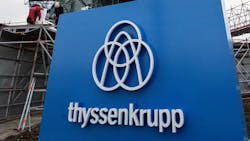FINANCIAL ROUNDUP: Lifted by Elevator Unit, ThyssenKrupp Returns to Profit
FRANKFURT AM MAIN, Germany — German heavy industry and steel giant ThyssenKrupp confirmed its full-year forecast on Thursday after swinging back to profit in the first quarter, lifted up by its elevator and auto parts businesses.
In what it described as a “good start to the new fiscal year”, the industrial giant reported a net income of 8.0 million euros ($8.53 million) between October and December, recovering from a 23-million-euro ($24.53 million) loss over the same period a year earlier.
Sales were up 6% at 10.1 billion euros ($10.77 billion) in the first quarter, slightly beating analyst expectations, while the group’s closely watched adjusted earnings before interest and tax rose by 40% to 329 million euros ($350.76 million).
The uptick comes as ThyssenKrupp is switching its focus from its traditional steel business, which has been battered by low prices, to making industrial goods and offering technical services.
CEO Heinrich Hiesinger said the latest results showed that “our strategy is right. … We’re increasing our share of capital goods and services businesses. That will enable us to generate more stable earnings and achieve profitable growth in the future.”
The group’s performance was led by its elevator unit and car and truck parts division, both of which saw earnings growth of 6%.
Hiesinger said the group was also seeing “the first positive earnings effects” from a recent recovery in steel prices, a trend that is expected to continue into the new year.
Looking ahead, ThyssenKrupp said it stood by its forecast for the 2016-2017 fiscal year, with adjusted earnings before tax and interest “expected to increase to around 1.7 billion euros” while net profit should reach “a clear year-on-year improvement”.
Hyundai Heavy Swings Back to Black
SEOUL — The world’s biggest shipbuilder, Hyundai Heavy Industries, made its first annual profit for three years in 2016, it said Thursday, after cutting thousands of jobs in an industry-wide slump.
Net income came to 682 billion won ($594.11 million) last year, a turnaround from a loss of 1.36 trillion won ($1.18 billion) in 2015, the South Korean company said in a regulatory filing.
“Cost reduction and increased productivity contributed to the turnaround, even when the global market remains sluggish”, a company spokesman told AFP. But sales dropped 15% on-year to 39.32 trillion won ($34.25 billion).
The company underwent a severe corporate restructuring last year that saw some 2,500 workers laid off, its board members’ salaries cut as much as 50% and assets sold for cash. It also gained from equity ties with Hyundai Oilbank Co., its refining unit, as its efforts to streamline its business portfolio also paid off.
Hyundai Heavy shares rose 1.38% to close at 146,500 won ($127.62). The firm’s last full-year profit came in 2013.
Hyundai Heavy said in November it will split its non-shipbuilding businesses into separate companies to improve management efficiency. It will spin off the non-core equipment and construction sectors from its mainstream activities including shipbuilding, offshore and industrial plants.
South Korea’s so-called “Big Three” shipbuilders Hyundai, Daewoo and Samsung Heavy Industries were once hailed as a major driver of the country’s export-reliant economy -- Asia’s fourth-largest -- before being forced since last year to shed thousands of jobs and assets to stay afloat.
The trio racked up collective losses of 8.5 trillion won ($7.40 billion) in 2015.
Copyright Agence France-Presse, 2017
About the Author
Agence France-Presse
Copyright Agence France-Presse, 2002-2025. AFP text, photos, graphics and logos shall not be reproduced, published, broadcast, rewritten for broadcast or publication or redistributed directly or indirectly in any medium. AFP shall not be held liable for any delays, inaccuracies, errors or omissions in any AFP content, or for any actions taken in consequence.
